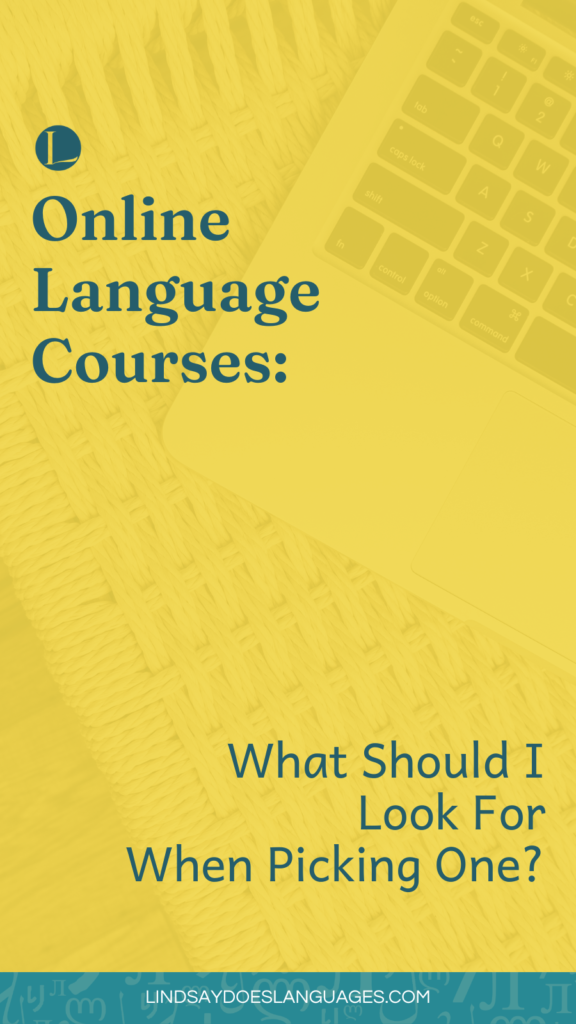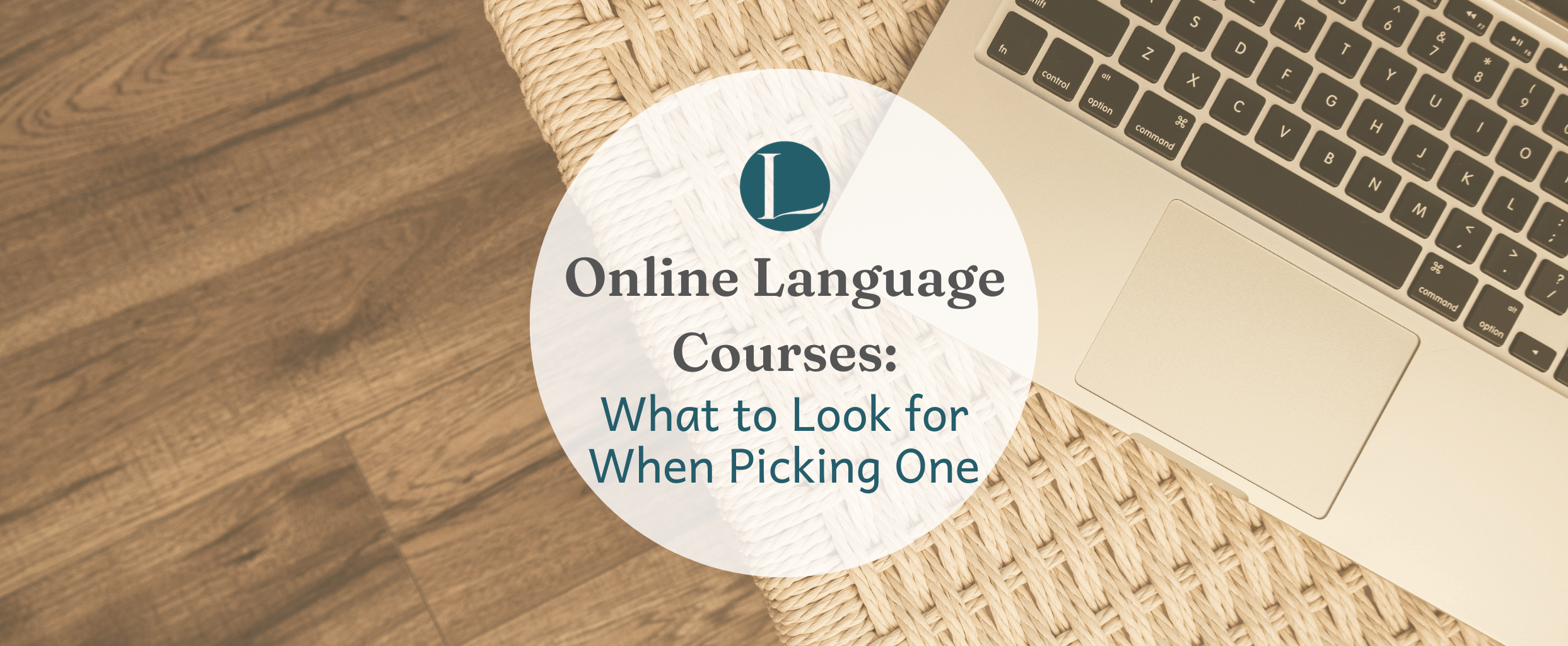January 19th, 2023
Online Language Courses: What Should I Look For When Picking One?
There are certain things we all want from an online language course. It should be flexible, affordable and easy to use. However, finding the right course can be tricky. We’ve put together this guide to help you choose one and make sure it’s right for you!

Before we start, if you prefer, you can listen to the podcast episode of this article or watch on YouTube too!
Click here to access the full podcast archives.
Subscribe to Lindsay Does Languages on YouTube here.
Content
What’s in a language course will vary massively. One French course could be covering everything you need to know for travel, another could be great if you’re using French for business, or it could be overwhelmingly full or disappointingly thin on the ground.
It’s important to know what you need from a language course, and then look for one that meets those needs. For example, if you want to learn the basics of Spanish before going on holiday, then you might not need anything too advanced. It’s easy often to think we want the biggest and most complete course in terms of content but it’s best if we can consider our needs and wants first.
If you want to know what’s inside an online language course, check the website for an overview of the curriculum. If for some reason you can’t find it but you’re still pretty intrigued by the course, contact the company and see what they can tell you about the content.
A good example of this is Gymglish* and their courses for English, French, German, Italian, and Spanish (my affiliate links shared throughout this post because I love their product!). Each day you get a manageable 15-20 minute lesson direct to your inbox designed to fit neatly into your life without the overwhelm of getting everything at once.
Flexibility
When choosing the best language course for you, flexibility is key. If you have a schedule that requires you to be in and out of your lessons quickly, it is important to ensure that the time commitment for each lesson is reasonable. The best way to do this is by looking at how many lessons per week are included in your chosen course, as well as how long each individual lesson lasts. Some language courses offer live elements such as weekly lessons, shorter-term commitments like monthly subscriptions, or self-study all-in-one-go style. So if you want more flexibility with your schedule but still want access to quality materials and tutors, definitely consider the flexibility you want!
Most online courses will allow students to complete their learning on mobile devices or computers using an app or browser-based websites. Some may offer lifetime access, while others give you a limited time. Make sure that whichever option works better for your lifestyle before signing up!
The way Gymglish* handles flexibility is by letting you join on a monthly subscription basis. So you can decide how long you want to learn. In the past, I’ve found monthly subscriptions to be really helpful when I’m after a short-term boost of speedy gains in a language. This works because knowing I’m going to be paying again next month makes me want to do as much as I can in the month I’m currently paying for!
Results
When you’re looking for a language course, efficiency is key. You want to find the best course for your needs and avoid wasting time on something that isn’t going to help you reach your goals. There are many factors that can help determine a good language course, but one of the most important things to consider is student satisfaction.
When looking at reviews or ratings of online courses, look for specific details about content and delivery methods rather than just overall opinions of the course as a whole. The best way to do this is by reviewing syllabi from other students who have taken the class before you—you should also be able to access these through most course websites. Looking at how much detail there is in each unit will give you an idea of whether or not it’ll be effective for what you’re looking for out of this particular learning experience.
There’s a whole host of Success Stories shared on Gymglish’s website that help to show their courses really get people results. Also, it’s worth remembering that your own results are what really matter most to you, right? So try recording yourself speak, write, and maybe do a quick language test online today. Then, give yourself a month and set a ‘Goldilocks’ goal (not overly huge, not too small, just right) and see what results you can get for yourself. After that time, you’ll have a better idea both of whether you’re getting the results you want and how much you’re enjoying the process. Gymglish* have kindly given me some promo codes to get you your first month for free so there’s nothing to lose! The only question now is: French, English, Italian, Spanish, or German?
Progress Tracking
You’re going to want to find out how the course tracks your progress. This is especially important if you’re a beginner and are just getting started in language learning, as you will want to know that the course takes into account where your skill level is at and adjusts accordingly.
It’s unlikely that any language learner will be able to make huge leaps in their learning overnight – not sorry for the truth! Instead of expecting too much, focus on making small improvements over time. Most courses will have some kind of way for you to see how far along you are, even if it’s just an estimate based on your time spent using the app or website.
Gymglish* do this wonderfully to keep you up to date and motivated. After your first few lessons, you’ll receive a level assessment placing your ability in line with the CEFR (Common European Framework of Reference for Languages). Then after 6 months of lessons, you get a learning report to help you see just how it’s all going. Perfect!
Culture
You’ll learn much more than just words and grammar when taking an online language course if you pick the right online language course — cultural nuances are also important. Look for courses that incorporate cultural elements so that you can get a better understanding of the language and its speakers’ worldviews.
I love that each daily email from Gymglish* ends with a ‘dessert’ – not chocolate-based, but I dare say as good! You get a short clip from film, TV, literature or music of unmissable culture related to each language.
As you know, I’m a huge advocate for bringing these things into your learning (I even have a course called Music Maestro to show you how to do it with music). So I love that Gymglish include these with their daily lessons!
Enjoyment
Of course, your results are key. There’s no point doing something that’s not actually helping you learn a language! But equally important in my book, whether it’s your first or thirty-first language is that you enjoy the online language course you choose.
That’s not to say that every single second you spend with your online language course will be like the thrill of jumping out of a plane (if that’s your kind of enjoyment…), but the majority of the time you spend should feel like a leisurely hobby you want to do and not a boring chore you’re obligated to do.
There’ll be days when you need to show up and you’re not really feeling it, of course. But overall, we’re going for skydiving adrenaline…ok maybe not quite that much adrenaline but you get my point.
If you’re curious as to whether Gymglish* courses are your kind of enjoyment level, hop onto the free trial they’ve kindly offered me to try it for yourself. Because I can’t tell you what’s fun for you. You get to decide that bit.
Want more?
Yay! Let’s do this. First things first, sign up to your free trial here for your preferred language course with Gymglish* (these names alone should be an indicator that you’re probably gonna enjoy yourself):
French – Frantastique
English – Gymglish
Spanish – Hotel Borbollón
German – Wunderbla
Italian – Saga Baldoria







